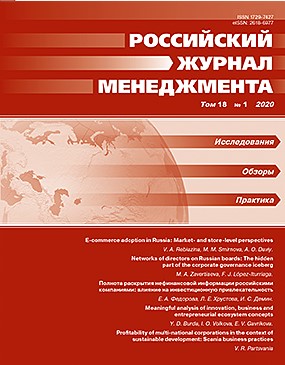Meaningful analysis of innovation, business and entrepreneurial ecosystem concepts
DOI:
https://doi.org/10.21638/spbu18.2020.104Аннотация
Over the last decade academic literature has faced a boom of publications devoted to the notion of ecosystem, which resulted in the emergence of various research streams and corresponding fragmentation of the research domain. The existing variety of meanings and contradictory definitions necessitates conducting a thorough literature review on three tightly coupled concepts of innovation ecosystem, business ecosystem and entrepreneurial ecosystem. This study is based upon a mixed technique, which combines a bibliometric analysis and in-depth investigation of papers devoted to these research streams. Through examining their theoretical background, constructing conceptual structures and performing an in-depth analysis we were able to define the essence of innovation, business and entrepreneurial ecosystems as well as their distinctive features. Then, we proceeded with a comparative analysis of these concepts, which allowed us to outline the existing similarities and to demarcate the concepts from an ontological perspective. This study provides certain clarification for the existing conceptual mix in the field of the ecosystem research and can be used as a foundation for a further investigation of the concept.
Ключевые слова:
ecosystem, innovation ecosystem, business ecosystem, entrepreneurial ecosystem, value creation, bibliometric analysis, coopetition
Скачивания
Библиографические ссылки
REFERENCES
Загрузки
Опубликован
Как цитировать
Выпуск
Раздел
Лицензия
Статьи журнала «Российский журнал менеджмента» находятся в открытом доступе и распространяются в соответствии с условиями Лицензионного Договора с Санкт-Петербургским государственным университетом, который бесплатно предоставляет авторам неограниченное распространение и самостоятельное архивирование.





